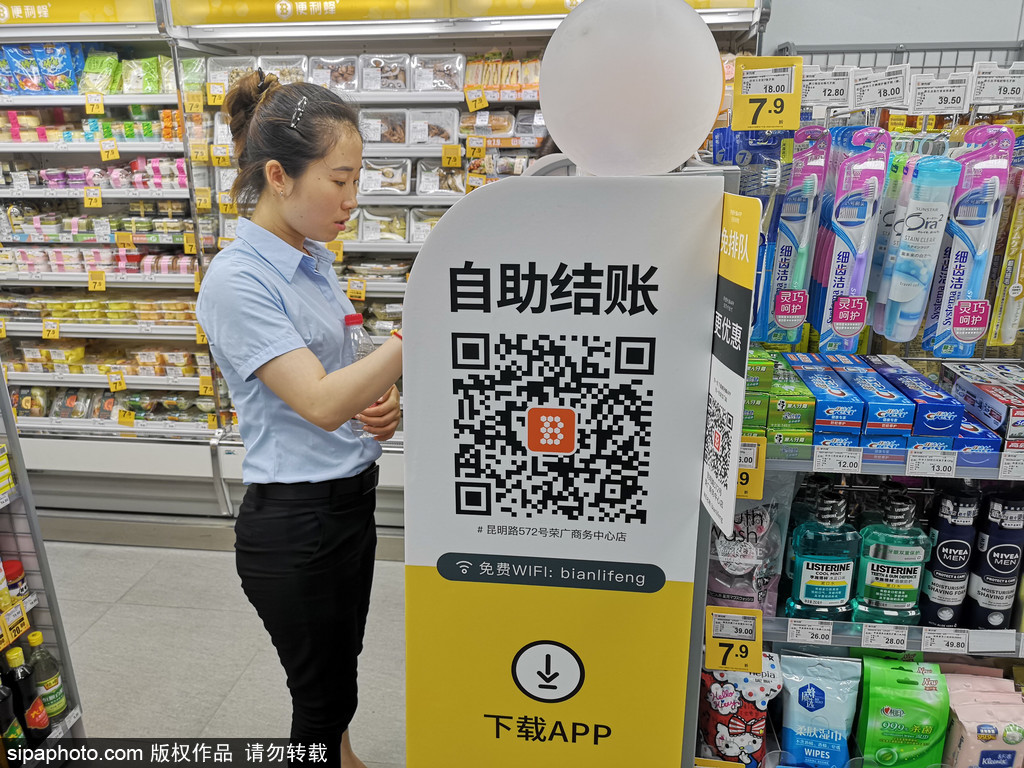

China is encouraging the development of smart convenience stores to upgrade the sector and consumption.

A woman shops at a Bianlifeng convenience store in Shanghai. (Photo/sipaphoto.com)
At one Suning convenience store in Nanjing, capital of east China’s Jiangsu province, cameras and smart shelves have been installed to recognize goods. Thanks to facial recognition technology, an automatic gate will open as customers walk out of the store while payment is made simultaneously. The average time a customer spends shopping in the store will be reduced by 45 seconds.
Han Peng, vice president of Suning Convenience Store Group, said the company will accelerate the expansion of smart convenience stores by applying for technologies, creating new business models, and integrating online and offline channels to learn about customers’ consumption preferences and needs.
The company will also enhance data usage and management, seek targeted sales and guide consumption, making convenience stores important parts of smart communities and smart cities, Han added.
China’s smart convenience store operator Bianlifeng has digitalized all links including production, logistics, stores and customers, resulting in rapid expansion.
Xue Enyuan, executive director of Bianlifeng, said that the convenience store sector will undergo unprecedented changes as it goes through consumption upgrading and will integrate big data and artificial intelligence technologies.
According to the 2019 report on China’s convenience stores issued by the China Chain Store and Franchise Association, the sales volume of the country’s top 100 convenience store companies hit 226.4 billion yuan in 2018, an increase of 19 percent. Meanwhile, China had 122,000 convenience stores that year, an increase of 14 percent over the previous year.
 Fire brigade in Shanghai holds group wedding
Fire brigade in Shanghai holds group wedding Tourists enjoy ice sculptures in Datan Town, north China
Tourists enjoy ice sculptures in Datan Town, north China Sunset scenery of Dayan Pagoda in Xi'an
Sunset scenery of Dayan Pagoda in Xi'an Tourists have fun at scenic spot in Nanlong Town, NW China
Tourists have fun at scenic spot in Nanlong Town, NW China Harbin attracts tourists by making best use of ice in winter
Harbin attracts tourists by making best use of ice in winter In pics: FIS Alpine Ski Women's World Cup Slalom
In pics: FIS Alpine Ski Women's World Cup Slalom Black-necked cranes rest at reservoir in Lhunzhub County, Lhasa
Black-necked cranes rest at reservoir in Lhunzhub County, Lhasa China's FAST telescope will be available to foreign scientists in April
China's FAST telescope will be available to foreign scientists in April "She power" plays indispensable role in poverty alleviation
"She power" plays indispensable role in poverty alleviation Top 10 world news events of People's Daily in 2020
Top 10 world news events of People's Daily in 2020 Top 10 China news events of People's Daily in 2020
Top 10 China news events of People's Daily in 2020 Top 10 media buzzwords of 2020
Top 10 media buzzwords of 2020 Year-ender:10 major tourism stories of 2020
Year-ender:10 major tourism stories of 2020 No interference in Venezuelan issues
No interference in Venezuelan issues
 Biz prepares for trade spat
Biz prepares for trade spat
 Broadcasting Continent
Broadcasting Continent Australia wins Chinese CEOs as US loses
Australia wins Chinese CEOs as US loses